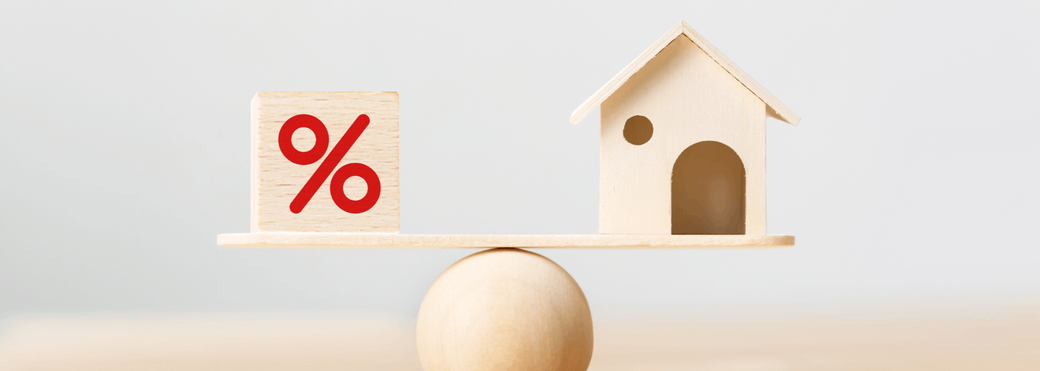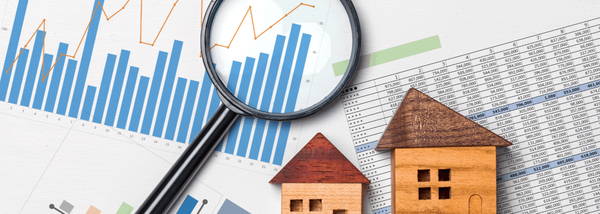Will Mortgage rates go down in 2024?

Aspiring homebuyers eagerly await the opportune moment to enter the real estate market, and for many, lower mortgage rates can't come soon enough. The silver lining is that signs indicate the wait for more favorable rates might not be too prolonged. However, it's essential to manage expectations because the days of historic lows witnessed in 2020 and 2021 are unlikely to return. Furthermore, once rates do decrease, prospective homebuyers will face their own set of challenges, including heightened competition and escalating home prices.
So, will mortgage rates experience a drop in 2024? While current indications lean towards that possibility, there are important insights for homeowners and potential buyers to consider. Let's delve into a comprehensive mortgage rate forecast for 2024.
What's Causing High Mortgage Rates?
Like many consumer interest rates, mortgage rates significantly hinge on the state of the economy. In 2022, rates saw an uptick due to rising inflation. To counteract inflation's surge, the Federal Reserve initiated a series of hikes to the federal funds rate, consequently keeping mortgage rates elevated.
However, since its peak in June 2022, inflation has notably decelerated. In September 2023, the Consumer Price Index stood at 3.7%, with projections pointing toward further moderation in the coming months. The Federal Reserve aims to bring inflation down to an annual rate of 2% and has hinted at maintaining elevated rates for a while. Recent statements from Federal Reserve officials suggest that they might have concluded their rate-hiking endeavors, which could prevent future spikes in mortgage rates.
Philadelphia Fed President Patrick Harker stated in a speech on October 13, "Absent a stark turn in what I see in the data and hear from contacts, both in one-on-one conversations and in forums like this, I believe that we are at the point where we can hold rates where they are."
Nonetheless, we might need to exercise patience before the Federal Reserve contemplates reducing rates, implying that mortgage rates may remain elevated until 2024.
"Bond market behavior suggests that rates are likely to remain elevated through the rest of the year, despite the last several inflation reports showing signs of cooling," notes Afifa Saburi, capital markets analyst for Veterans United Home Loans. "The services segment of inflation is proving to be sticky, and the wages component of the labor market remains solid – all of which points to holding interest rates at higher levels longer until slower growth no longer calls for aggressive monetary policy."
As inflation approaches the Federal Reserve's target, we may begin to witness a decline in rates.
Mortgage Rate Predictions for 2024
Most major forecasts anticipate a decrease in rates in 2024. However, the exact timing of this decline remains a question. Here's how some leading predictions align:
- Q1 2024: Mortgage Bankers Association: 6.3%, Fannie Mae: 6.9%, National Association of Realtors: 6.0%
- Q4 2024: Mortgage Bankers Association: 6.1%, Fannie Mae: 6.7%, National Association of Realtors: 6.0%
Fannie Mae's forecast suggests that 30-year mortgage rates will range between 6.7% and 7.1% in 2024, while NAR believes rates will hover closer to 6%. The MBA forecast predicts a drop to 6.1% by the year's end.
Although there may be some disparity in rate predictions, the general consensus is that mortgage rates are poised to dip below 7% in 2024.
When Can We Expect 3% Mortgage Rates Again?
The possibility of rates returning to the 3% range remains open, but current trends indicate that such lows might not reoccur anytime soon.
Consider the reason behind the previous plummet in rates: In response to the COVID-19 pandemic, the Federal Reserve reduced the federal funds rate to near-zero and engaged in substantial purchases of mortgage-backed securities to avert an economic crisis. This enabled 30-year mortgage rates to reach a historic low of 2.65% in January 2021, as reported by Freddie Mac.
Predicting precisely when another event that significantly reshapes the economy, like the pandemic, will take place is challenging. However, unless an extraordinary occurrence transpires, we should not anticipate rates falling to such depths for quite some time. Lawrence Yun, the chief economist at the National Association of Realtors, even stated that he doesn't foresee mortgage rates returning to the 3% range within his lifetime.
Is It Wise to Wait for Lower Mortgage Rates Before Buying a Home?
In a climate where mortgage rates are the highest they've been in over two decades, some prospective homebuyers may be inclined to postpone their home search in anticipation of more favorable rates. Nonetheless, this might not necessarily be the optimal strategy, as there are distinct advantages to buying in the current market.
Presently, the vast majority of borrowers are enjoying rates considerably lower than the prevailing rates. According to a Redfin analysis of Federal Housing Finance Agency data, over 90% of homeowners have mortgages with rates below 6%. A significant proportion boasts rates even below 4%.
The persistence of high rates has discouraged many of these homeowners from selling, as they are reluctant to relinquish their existing favorable rates. While this has led to constrained inventory, the reduced influx of buyers into the market has also kept prices relatively stable.
Karen Kostiw, a real estate agent with Coldwell Banker Warburg in New York City, emphasizes that "buyers should seize opportunities now to secure deals at lower prices and consider refinancing next year if rates do decrease." She suggests that buyers who are capable of purchasing a home now can escape a potentially competitive market by locking in a purchase and subsequently benefit from a refinance when rates fall. However, it's crucial to shop around and obtain quotes from multiple mortgage refinance lenders to secure the best possible rate.
Categories
Recent Posts











